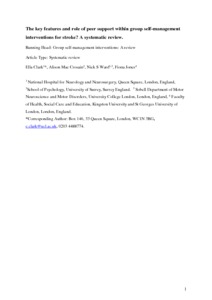Clark, E; MacCrosain, A; Ward, NS; Jones, F
(2020)
The key features and role of peer support within group self-management interventions for stroke? A systematic review.
Disabil Rehabil, 42 (3).
pp. 307-316.
ISSN 1464-5165
https://doi.org/10.1080/09638288.2018.1498544
SGUL Authors: Jones, Fiona
![[img]](https://openaccess.sgul.ac.uk/115305/1.hassmallThumbnailVersion/Ward_review%20manuscript_resubmission2.pdf)  Preview |
|
PDF
Accepted Version
Available under License ["licenses_description_publisher" not defined].
Download (529kB)
| Preview
|
Abstract
Purpose: To assess the key features of group self-management interventions for stroke and explore the role of peer support in this setting.Method: A segregated mixed research synthesis was conducted. A literature search was performed in OvidSP, EMBASE, AMED and EBSCO (up to January 2018). Studies were included if they delivered group interventions containing self-management principles to stroke survivors on more than two consecutive occasions. The bias of included studies was assessed using NICE guidelines. Quantitative data were analyzed using frequency counts and qualitative data were analyzed thematically.Results: Twelve studies were included in the review including a total of 3298 participants (age range 56-89) and eight different self-management interventions. Key features of group self-management interventions were identified as increasing knowledge, collaboration and/or communication, accessing resources, goal setting, and problem solving. Peer support facilitated the sharing of experiences, social comparison, vicarious learning, and increased motivation.Conclusion: Future self-management interventions should be designed to maximize peer support and incorporate techniques which facilitate, knowledge building, goal setting, access to resources, problem solving, and communication.Implications for rehabilitationGroup self-management interventions offer a way to provide peer support to stroke survivors and should be utilized in practice.Peer support is seen by stroke survivors as valuable because it can facilitate the sharing of experiences, social comparison, vicarious learning, and increase motivation.Knowledge building, goal setting, problem solving, collaborative skills, and the ability to access resources should be incorporated into interventions aiming to enhance self-management behaviors in the stroke population.
| Item Type: |
Article
|
| Additional Information: |
This is an Accepted Manuscript of an article published by Taylor & Francis in Disability and Rehabilitation on 16/10/2018, available at: http://www.tandfonline.com/10.1080/09638288.2018.1498544. |
| Keywords: |
Stroke, chronic disease, group interventions, peer support, self-efficacy, self-management, Humans, Motivation, Peer Group, Psychosocial Support Systems, Self-Help Groups, Self-Management, Stroke Rehabilitation, Humans, Motivation, Peer Group, Self-Help Groups, Stroke Rehabilitation, Psychosocial Support Systems, Self-Management, Stroke, self-management, group interventions, self-efficacy, peer support, chronic disease, 11 Medical and Health Sciences, Rehabilitation |
| SGUL Research Institute / Research Centre: |
Academic Structure > Population Health Research Institute (INPH) |
| Journal or Publication Title: |
Disabil Rehabil |
| ISSN: |
1464-5165 |
| Language: |
eng |
| Publisher License: |
Publisher's own licence |
| Projects: |
|
| PubMed ID: |
30325686 |
| Web of Science ID: |
WOS:000510535600002 |
| Dates: |
| Date |
Event |
| 2020-02 |
Published |
| 2018-10-16 |
Published Online |
| 2018-07-05 |
Accepted |
|
 |
Go to PubMed abstract |
| URI: |
https://openaccess.sgul.ac.uk/id/eprint/115305 |
| Publisher's version: |
https://doi.org/10.1080/09638288.2018.1498544 |
Statistics
Item downloaded times since 04 Apr 2023.
Actions (login required)
 |
Edit Item |



